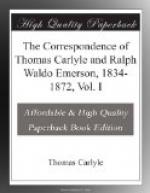You asked me about Landor and Heraud. Before my paper entirely vanish, let me put down a word about them. Heraud is a loquacious scribacious little man, of middle age, of parboiled greasy aspect, whom Leigh Hunt describes as “wavering in the most astonishing manner between being Something and Nothing.” To me he is chiefly remarkable as being still—with his entirely enormous vanity and very small stock of faculty—out of Bedlam. He picked up a notion or two from Coleridge many years ago; and has ever since been rattling them in his head, like peas in an empty bladder, and calling on the world to “List the Music of the spheres.” He escapes assassination, as I calculate, chiefly by being the cheerfulest best-natured little creature extant.—You cannot kill him he laughs so softly, even when he is like killing you. John Mill said, “I forgive him freely for interpreting the Universe, now when I find he cannot pronounce the h’s!” Really this is no caricature; you have not seen the match of Heraud in your days. I mentioned to him once that Novalis had said, “The highest problem of Authorship is the writing of a Bible.”— “That is precisely what I am doing!” answered the aspiring, unaspirating.*—Of Landor I have not got much benefit either. We met first, some four years ago, on Cheyne Walk here: a tall, broad, burly man, with gray hair, and large, fierce-rolling eyes; of the most restless, impetuous vivacity, not to be held in by the most perfect breeding,—expressing itself in high-colored superlatives, indeed in reckless exaggeration, now and then in a dry sharp laugh not of sport but of mockery; a wild man, whom no extent of culture had been able to tame! His intellectual faculty seemed to me to be weak in proportion to his violence of temper: the judgment he gives about anything is more apt to be wrong than right,—as the inward whirlwind shows him this side or the other of the object; and sides of an object are all that he sees. He is not an original man; in most cases one but sighs over the spectacle of common place torn to rags. I find him painful as a writer; like a soul ever promising to take wing into the Aether, yet never doing it, ever splashing webfooted in the terrene mud, and only splashing the worse the more he strives! Two new tragedies of his that I read lately are the fatalest stuff I have seen for long: not an ingot; ah no, a distracted coil of wire-drawings salable in no market. Poor Landor has left his Wife (who is said to be a fool) in Italy, with his children, who would not quit her; but it seems he has honestly surrendered all his money to her, except a bare annuity for furnished lodgings; and now lives at Bath, a solitary sexagenarian, in that manner. He visits London in May; but says always it would kill him soon: alas, I can well believe that! They say he has a kind heart; nor does it seem unlikely: a perfectly honest heart, free and fearless, dwelling amid such




